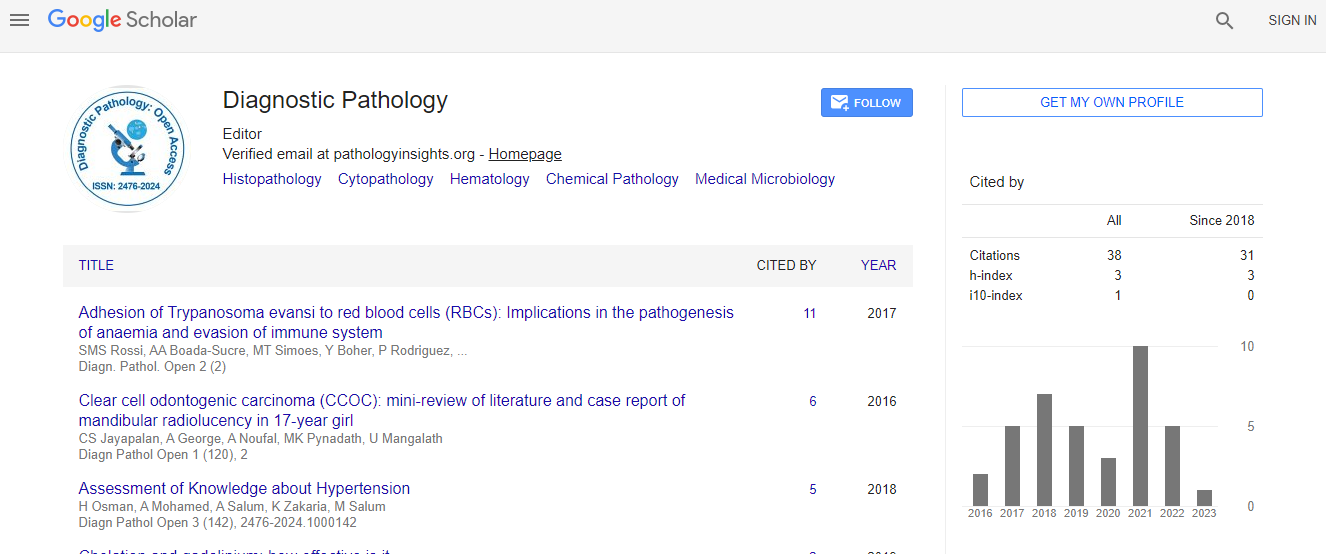Our Group organises 3000+ Global Conferenceseries Events every year across USA, Europe & Asia with support from 1000 more scientific Societies and Publishes 700+ Open Access Journals which contains over 50000 eminent personalities, reputed scientists as editorial board members.
Open Access Journals gaining more Readers and Citations
700 Journals and 15,000,000 Readers Each Journal is getting 25,000+ Readers
Google Scholar citation report
Citations : 110
Diagnostic Pathology: Open Access received 110 citations as per Google Scholar report
Diagnostic Pathology: Open Access peer review process verified at publons
Indexed In
- Google Scholar
- RefSeek
- Hamdard University
- EBSCO A-Z
- Publons
- Euro Pub
- ICMJE
Useful Links
Share This Page
Role of of protein tyrosine phosphatase receptor type �³ in chronic myeloid leukemia
13th International Conference on Laboratory Medicine & Pathology
Claudio Sorio
University of Verona, Italy
Keynote: Diagn Pathol Open
Abstract
Protein tyrosine phosphatase receptor gamma (PTPRG) is a ubiquitously expressed member of the protein tyrosine phosphatase family known to act as a tumor suppressor gene in many different neoplasms with mechanisms of inactivation including mutations and methylation of CpG islands in the promoter region. We identified a critical role in human hematopoiesis and describe a role as oncosuppressor in chronic myeloid leukemia (CML). We have described PTPRG expression in various tissues and recently developed a monoclonal antibody capable of recognizing the native antigen of this phosphatase by flow cytometry: we confirmed PTPRG protein downregulation in CML patients at diagnosis in the Philadelphia-positive myeloid lineage (including CD34+/CD38bright/dim cells). After effective tyrosine kinase inhibitor (TKI) treatment, its expression recovered in tandem with the return of Philadelphia-negative hematopoiesis. Of note, PTPRG mRNA levels remain unchanged in tyrosine kinase inhibitors (TKI) non-responder patients, confirming that downregulation selectively occurs in primary CML cells. We have also identified a novel regulative loop involving CTNNB1 gene. The availability of this unique antibody permits its evaluation for clinical application including the support for diagnosis and follow-up of these disorders. Evaluation of the role of PTPRG in health and disease is facilitated by the availability of a specific reagent capable to specifically detect its target in various experimental conditions.Biography
Claudio Sorio has completed his MD from University of Verona, Italy and his PhD and Postdoctoral studies from Thomas Jefferson University, Philadelphia, USA. He specilized in Surgical Pathology at the same university. He is the Director of Cystic Fibrosis Traslational Research Laboratory “D Lissandrini” at the University of Verona and Head of the Biomarker Laboratory at the same institution. He has published more than 74 original papers and several reviews and book chapters in reputed journals and has been serving as an Editorial Board Member of reputed journals.
E-mail: claudio.sorio@univr.it

 Spanish
Spanish  Chinese
Chinese  Russian
Russian  German
German  French
French  Japanese
Japanese  Portuguese
Portuguese  Hindi
Hindi 
